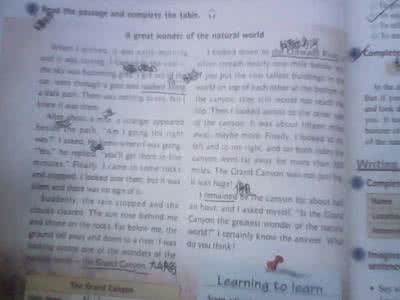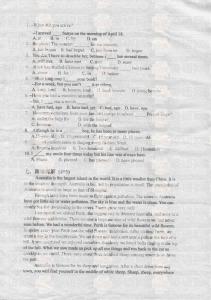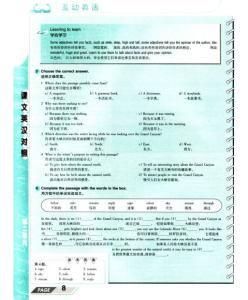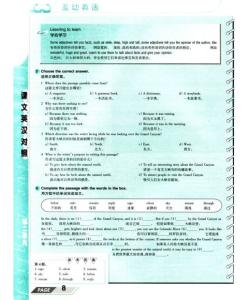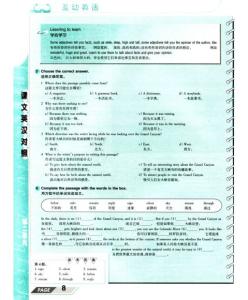做好每份英语试题不仅是对学生英语知识掌握的一个考查,通过试题卷的检测,还能找出他们在学习上的一些遗漏的地方。所以,你准备好了做这一份试卷吗?接下来,小编就和大家一起来做份外研版初三上册英语Module 8测试试题,希望对大家有帮助!
外研版初三上册英语Module 8测试试题
Ⅰ. 词汇(共10分,每小题1分)
A) 根据句意及首字母提示补全句中所缺单词。
1. In the game our school team got fifteen p________.
2. I’ve wanted to speak to you, but I haven’t had the c________.
3. Tokyo is the capital city of J________.
4. We reached that hotel at n________ and had lunch there.
5. They are thinking of a new m________ of solving the problem.
B) 根据句意从方框中选出恰当的单词填空,有的需要变换形式。
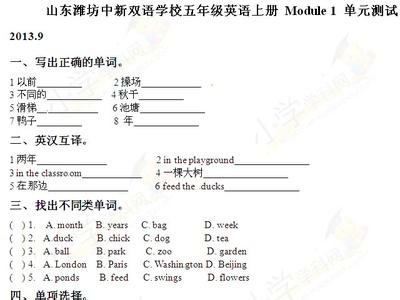
Asia, ability, decision, seat, kick
6. The man has made a good ________ on this.
7. The children were ________ a ball on the playground at that time.
8. She has no ________ to finish the work by herself. She needs some help.
9. China and India are ________ countries.
10. The boy entered the restaurant and chose a window ________ to sit down.
Ⅱ. 单项选择(共15分,每小题1分)
从各题后所给的四个选项中选择可以填入空白处的最佳答案。
( )11. —Which team will you play _______ next week?
—A team from Beijing. I’m sure we’ll beat the team.
A. for B. against
C. in D. with
( )12. We get mad ________ each other, like any family.
A. in B. to
C. at D. by
( )13. —Do you know _______ the last score was?
—106 to 98.
A. when B. where
C. what D. how
( )14. —Late again! What’s your ________ this time?
—I’m sorry. I missed the school bus.
A. rule B. excuse
C. order D. tool
( )15. The boy likes running and he’s training for the 100-metre ________.
A. race B. speech
C. sofa D. platform
( )16. —I was asked to do all the work.
—It was not ________. Other children should help you do it.
A. terrible B. fair
C. useful D. wrong
( )17. The players played _______ badly _______ lots of people left the stadium early
A. so; that B. very; that
C. too; to D. enough; to
( )18. The old man isn’t in good health. He ________ from a bad illness.
A. learns B. escapes
C. suffers D. separates
( )19. The girl did very well, and she ________ the record at the game.
A. broke B. remembered
C. pulled D. explained
( )20. Jenny doesn’t like chemistry, but her parents often encourage her _______ it well.
A. learn B. learning
C. learns D. to learn
( )21. The heavy rain stopped them ________ the science museum yesterday.
A. visit B. visiting
C. to visit D. visited
( )22. —What are you going to do after college?
—I’d like to _______ a company of my own.
A. lift up B. set up
C. look up D. pick up
( )23. It’s said that Paul _______ to take part in the match by his school yesterday.
A. has chosen B. is c hosen
C. was chosen D. is going to choose
( )24. —______ you _______ to watch TV last night, David?
—Yes, I was.
A. Did; allow B. Will; allow
C. Were; allowed D. Have; allowed
( )25. —Are you going to offer to work over the weekend?
—________ I want to have more free time.
A. It’s my ple asure. B. What’s up?
C. That’s not the point. D. No way!
Ⅲ. 完形填空(共10分,每小题1分)
先通读下面的短文,掌握其大意,然后从A、B、C、D四个选项中选出可以填入空白处的最佳答案。
Long time ago, housework was hard because people didn’t have water or electricity at home. One of the most
26 housework activities was washing clothes. People had to wash their clothes with their hands. They usually took their dirty clothes to a 27 and used rocks, sand and river water to clean them. It was 28 hard work.
For many years, people tried to find easier ways to wash their clothes. Sailors (水手), for example, put their clothes in bags and 29 them into the sea. This way worked quite well because the moving water 30 .
In 1858, the rotary (旋转式的) washing machine was invented, 31 it was difficult to use. The water was cold, so people had to first warm 32 with a fire. After the machine washed the clothes, people had to pull the clean, 33 clothes through a special machine to get the water out of them.
Later, the first electric washing machine was invented. It was more convenient (方便的) 34 it could warm the water. But the clothes were still very wet. The automatic (自动的) washing machine wasn’t invented until 1937. This 35 has changed our lives. Today, washing machines get clothes clean for us while we sit and relax.
( )26. A. interesting B. difficult
C. important D. popular
( )27. A. hotel B. farm
C. mountain D. river
( )28. A. hardly B. still
C. always D. even
( )29. A. separated B. turned
C. threw D. cut
( )30. A. helped B. lifted
C. stopped D. shone
( )31. A. and B. but
C. or D. so
( )32. A. them B. it
C. him D. her
( )33. A. warm B. cold
C. dry D. wet
( )34. A. if B. though
C. because D. till
( )35. A. invention B. idea
C. message D. project
Ⅳ. 情景交际(共5分,每小题1分)
根据对话内容从方框中选出能填入空白处的最佳选项补全对话,其中有两项多余。
A: Hello! May I ask you some questions?
B: Of course.
A: (36)________
B: Basketball.
A: (37)________
B: Yao Ming, of course. (38)________
A: When and where was he born?
B: (39)________
A: When did he start playing basketball?
B: He started playing basketball in 1989, at the age of nine.
A: (40)________
B: For about eight years.
A: Thank you for answering my questions.
B: You’re welcome.
A. Who is your favourite basketball player?
B. He was born in Shanghai in 1980.
C. I often watch the basketball games on TV.
D. What’s your favourite sport?
E. How long did he play basketball in NBA?
F. When did he go to America?
G. He is a famous basketball player.
 爱华网
爱华网